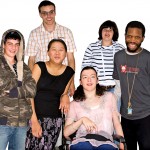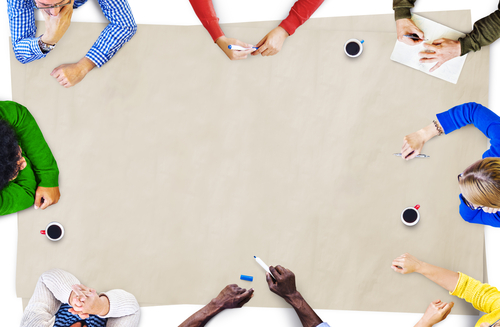
Everyone has a right to a sexual identity, but this right is often denied to people with learning disabilities due to negative social attitudes, arising out of fear or ignorance (Fitzgerald & Withers, 2013).
Often people with learning disabilities are thought of as living as perpetual adolescents (Bane et al, 2013), which is a pervasive discourse, but one that is perceived as benign by the general population, so it is difficult to challenge. Sexuality in people with learning disabilities can cause anxiety in support networks, which can result in restrictive, prohibitive and regulating practices.
Due to these practices, many people with learning disabilities are often not given opportunities to talk about their sexuality, let alone opportunities to actively explore and develop their sexual identity. One of the ways in which people with learning disabilities can have their voices heard is through self-advocacy groups.
A self-advocacy group in Malta chose to talk about sexuality and relationships in their meetings and the current paper presents an analysis of this conversation.

One self advocacy group discussed sexuality and relationships and disseminated the results.
Methods
This study was undertaken in collaboration with service users who were involved in all aspects of the research process. A self-advocacy group in Malta wanted to discuss sexuality and relationships as part of their usual meetings.
The aim of the research was to put forward the views of people with learning disabilities about their relationships and their sexuality. The research team provided a list of questions to the self-advocacy group about the topics of sexuality and relationships.
Some of the members of the group disseminated what was said during the meeting to paid carers and families while the two researchers performed thematic and discourse analyses on the data.
Results
Thematic analysis: Perceptions of sexuality
One of the main themes focused on disability and being in a relationship not being mutually exclusive and that the members of the self-advocacy group had ideas for preferred relationships and preferred sexual partners.
They were also aware that parents and carers had the potential to limit their sexual expression and exert control over whether they could have a relationship.
Some of the members of the self-advocacy group acknowledged their need for support at times, but reported that that support often seemed to be over-protective.
The members of the self-advocacy group also discussed ways in which people had potentially judged them for violating sexual norms. For example, the wider public may not always approve of expressions of sexuality, such as kissing in public. However, there was an acknowledgement that the context in which sexual expression took place was important.
Discourse analysis: Constructing sexual selves
One of the ways discourse analysis aims to analyse data is to examine the social nature of ‘talk’ as well as its performative function, which refers to speech acting as a means of defining identity.
The self-advocacy group created a context in which people with learning disabilities could challenge stereotypes of them being asexual and create pictures of themselves as people who can act on their own sexuality. Some members of the self-advocacy group resisted the discourse that their parents needed to protect them.

The group discussed the right to have sex and be in a relationship, but talked about difficulties with family members and support networks aomwtimes not approving of their relationships.
However, not everyone involved in the research resisted the norms and stereotypes. It appeared that some of the self-advocacy group had internalised some of the sexual norms, particularly those that arose from religious teachings, such as sex being shameful, or only being appropriate within marriage and for reproduction and not being an appropriate conversational topic. This was evidenced by some members laughing or giggling at sexually suggestive material.
The researchers considered that an absorption of sexual norms and traditional discourses around disability and sexuality can manifest as an internal battle between what people with learning disabilities in Malta, a country with a strict Catholic culture, have been brought up to believe and changing ideas about the rights of people with learning disabilities.
Strengths and limitations
This study is an excellent demonstration of service users collaborating with researchers throughout the entire research process, from putting forward the research topic to disseminating the results. Indeed, it is commendable that the word ‘participants’ was never used throughout the paper, as befits inclusive research practice.
The use of discourse analysis was an appropriate qualitative research method, because the ‘talk’ was naturally occurring; the conversation would have happened as part of the self-advocacy group, whether or not the conversation was recorded. This suggests that sexuality and relationships was of interest to the group members, not just a topic that outsider researchers were interested in and imposed on the self-advocacy group.
The researchers also did a good job of contextualising the society in which the conversation took place. Maltese society is heavily influenced by Catholicism, where there are likely deeply ingrained discourses around sexuality for all members of that society, not just people with learning disabilities. The researchers also highlighted ways in which these discourses influence real-life institutional practices in Malta, such as the state not supporting people with learning disabilities to live together as couples.
One of the themes found in this study was that families were an important aspect developing relationships, and if their families did not consent, then it was not possible to have a relationship. It would be interesting for the researchers to have explored how people with learning disabilities negotiate their relationships and sexuality with their parents.
Although some of the themes in the current research were supported by quotations from the original data, it would have been good to have quotations to illustrate all of the themes that arose from the research, because this is one of the main ways in which the quality of qualitative research can be assessed.
Summary
In terms of implication for clinical practice, we should be aware of the practical and socially constructed barriers that people with learning disabilities are faced with when exploring their sexuality and beginning relationships.
Consequently, some people may limit themselves and not ask for opportunities to discuss relationships or sexuality for fear of being judged by others.
Therefore, clinicians need to model discussing relationships and sexuality in a matter of fact way in order to both provide opportunities for people to create their sexual identities and normalise talking about sexuality.
The authors noted that non-heteronormative relationships were largely hidden during the analysis, which suggests that for people who want to engage in same sex relationships or sexual practices or who may want to identify as transgender, that they may have to overcome yet another additional level of stigma (Noonan & Gomez, 2011) and may require even further support from clinicians to be able to have discussions around their sexuality.

We need honest, non-judgemental and matter of fact conversations about sex and relationships in order to support people to develop their sexuality with confidence.
Links
Azzopardi-Lane, C. & Callus, A.M. (2014) Constructing sexual identities: People with intellectual disability talking about sexuality. British Journal of Learning Disability, 43, 32-37 [abstract]
References
Bane, G., Dooher, M. Flaherty, J., Mahon, A., Donagh, P. et al (2012) Relationships of people with learning disabilities in Ireland. British Journal of Learning Disability, 40, 109-22.
Fitzgerald, C. & Withers, P. (2013) ‘I don’t know what a proper woman means’: what women with intellectual disabilities think about sex, sexuality and themselves. British Journal of Learning Disability, 41, 5-12.
Noonan, A. & Gomez, M.T. (2011) Who’s missing? Awareness of lesbian, gay, bisexual and transgender people with intellectual disability. Sex Disabil. 29, 175-80

People with learning disabilities talking about sex and relationships http://t.co/0b92qf4SGT via @sharethis
“There’s no need to laugh. Isn’t this a normal subject?” People with learning disabilities talking about sex http://t.co/XFaity2Xf5
“There’s no need to laugh. Isn’t this a normal subject?” People with learning disabilities talking about sex and… http://t.co/8JkdROAPlr
People with learning disabilities need to be able to talk about sexuality, sex & relationships http://t.co/zxWeN5aW15
People with learning disabilities talk about sex & relationships http://t.co/e8GUERn8pv
I wrote this for the @LearningDisElf: People with learning disabilities need to talk about sexuality & relationships http://t.co/9nznAypk4X
Don’t miss: People with learning disabilities need to be able to talk about sexuality, sex & relationships http://t.co/zxWeN5aW15
People with learning disabilities talking about sex and relationships http://t.co/a5HZcyDFuu
@mishkasaurus via @LearningDisElf on sexuality & relationships & ppl w #LD – Topic needs open & and frank discussion! http://t.co/uCdmUZx0TT
Interesting piece from @learningdiself on people with learning disabilities talking about sexuality and relationships http://t.co/CUGakx0HBH
#CDCwhistleblower News People with learning disabilities talk about sex & relationships http://t.co/K1DvdlSmIq It’s Connected #B1Less
People with learning disabilities talk about sex & relationships – Learning Disability Elf http://t.co/Tx1Z06iqN9
“No need to laugh.” People with learning disabilities talking about sex & relationships http://t.co/W0hZ92EtPx via @mishkasaurus @LearningD…